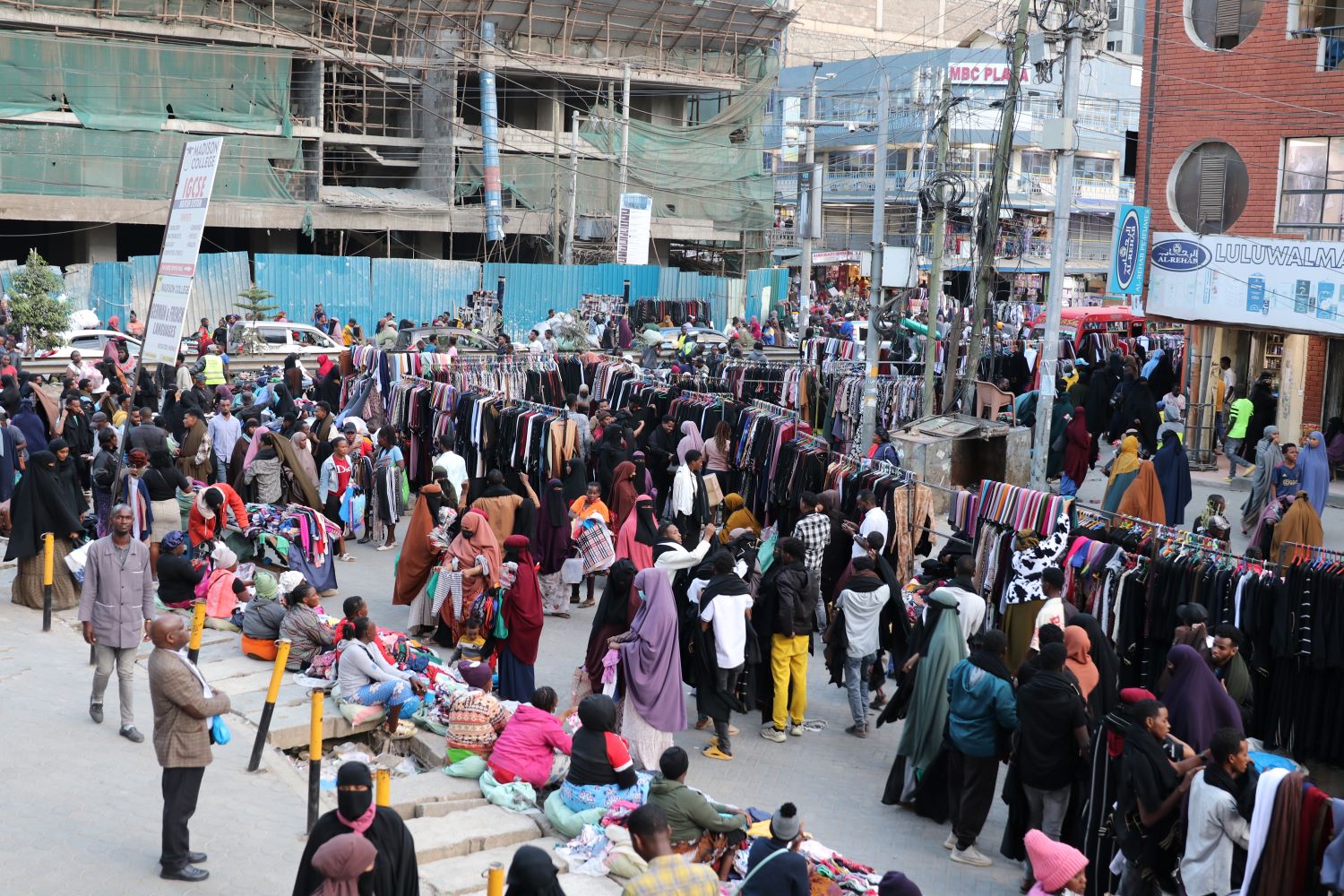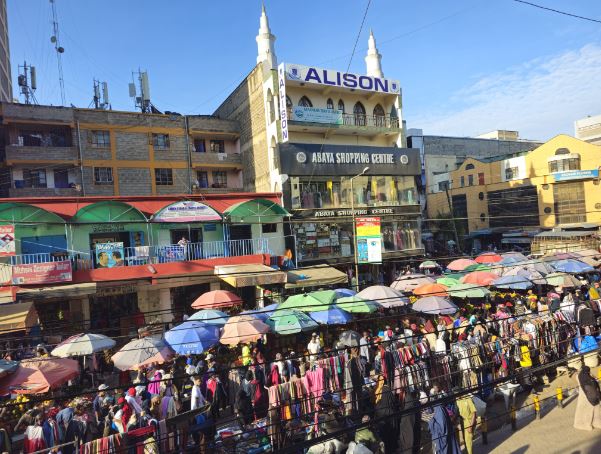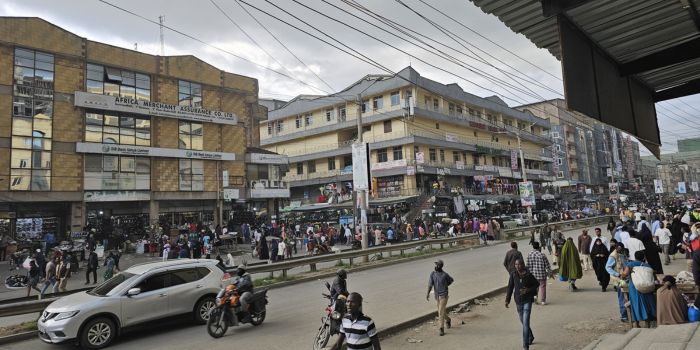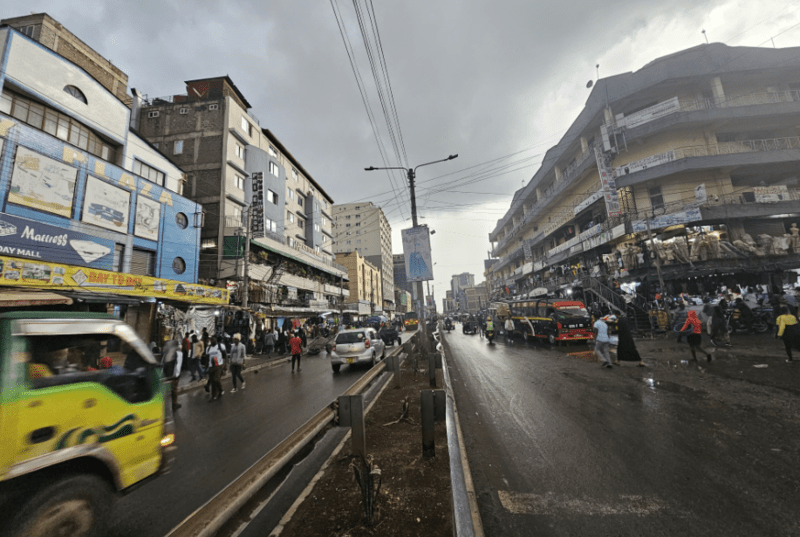Stakeholders challenge State’s plan to designate hawker spaces in Eastleigh

By Albert Mwazighe |
Over the last decade, as Eastleigh’s reputation as a profitable business hub has grown, many traders in Nairobi have dumped popular markets such as Muthurwa to move to the business district.
On a busy Thursday afternoon, Osman Noor, a manager at the Eastleigh Social Hall and Business Centre, sits in his office, his gaze locked on a screen displaying footage from various CCTV cameras outside the facility.
He is looking out for any encroachment of space in front of the business centre by hawkers, who have made a habit of displaying their wares right in front of entrances to some of the stalls in the building.
Keep reading
“I have been receiving complaints from my tenants that many of their clients, who used to come from different parts of the country, including Nakuru, Eldoret, Kisumu, and Garissa, are no longer coming to Eastleigh to purchase goods from them,” said Osman.
One of the reasons behind this is that the hawkers illegally dump waste right next to buildings, creating an environment that is not welcoming to visitors.
The hawkers also block the entrances and roads adjacent to the building, thus preventing buyers from parking their vehicles for loading.
This has resulted in the relocation of several traders previously operating at the business centre to other places, as evidenced by the high number of vacancies in the building, something you would not expect in a vibrant business hub such as Eastleigh.
“We are lucky because one of our tenants here is the Nairobi City County ‘Kanjo’, who conduct frequent operations, so the hawkers are afraid of being caught unawares,” posed Osman.
 Hawkers sell their wares along Jam Street in Eastleigh, Nairobi. (Photo: Abdirahman Khalif/File/EV)
Hawkers sell their wares along Jam Street in Eastleigh, Nairobi. (Photo: Abdirahman Khalif/File/EV)
Others, like Mohamed Abdi, the manager of Prime Shopping Mall, are not so lucky to have Nairobi City County offices as one of their tenants. He and his tenants have to wrestle with hawkers for space every day.
The situation worsens in the evening when there are no law enforcement officers to stop the hawkers from displaying their merchandise outside the shopping mall or by the roadside.
“There have been numerous attempts to solve the crisis of the hawkers, but when they are removed from the entrance to the mall, you give them one week and they come back,” said Abdi.
Over the last decade, as Eastleigh’s reputation as a profitable business hub has grown, many traders in Nairobi have dumped popular markets such as Muthurwa to move to the business district.
The traders opt to display their wares in places such as outside malls and by the road, where they pay a certain fee to cartel groupings for protection.
This has seen the number of hawkers in Eastleigh grow significantly over the years, with figures from the Eastleigh Business District Association revealing that by 2023, approximately more than 20,000 hawkers were operating in Eastleigh.
“It is a bit unfair when the tenant has to pay rent, service fees including water and garbage, fire licence, and business permit, among others, yet the hawker who sells outside his shop only pays Sh1000, and you still expect the two to compete, selling almost the same products,” stated Abdi.
 Mohamed Yusuf Haji Avenue in Eastleigh, Nairobi, is pictured on May 15, 2024, following the forceful eviction of hawkers by Nairobi City County askaris. (Photo: Abdirahman Khalif)
Mohamed Yusuf Haji Avenue in Eastleigh, Nairobi, is pictured on May 15, 2024, following the forceful eviction of hawkers by Nairobi City County askaris. (Photo: Abdirahman Khalif)
In a stakeholder forum held recently at the Micro and Small Enterprise Authority (MSEA) headquarters, MSMEs and cooperatives Cabinet Secretary Simon Chelugui said that the government is in the process of designating specific areas in Eastleigh to informal traders.
This is to ensure that they do not interfere with other businesses while conducting their operations and to protect them from the authorities, who have been accused of using excessive force while dealing with hawkers in some instances.
“We know of cases where some officers impound goods belonging to hawkers who fail to pay bribes while allowing those who pay bribes to continue operating. This has to stop,” said Chelugui.
The CS said that the government will work with the county government of Nairobi, to identify street corridors that can serve at least 50 informal traders each.
“A majority of these hawkers are young people who cannot afford to rent formal shops and are forced to display their wares in open spaces. It is time for us to designate specific places where these traders can work,” noted Chelugui.
As well-intentioned as this initiative is, Jeff Oteba, the chairman of the Eastleigh Hawkers Association, said that there have been numerous attempts of a similar nature to solve the impasse between hawkers and mall operators in Eastleigh.
“These have, however, not been successful, as a result of political interference from people with vested interests,” said Oteba.
 An view of the Mohamed Yusuf Haji Avenue in Eastleigh, Nairobi. Hawkers have been kept at bay by Nairobi City County askaris. (Photo: Abdirahman Khalif/File/EV)
An view of the Mohamed Yusuf Haji Avenue in Eastleigh, Nairobi. Hawkers have been kept at bay by Nairobi City County askaris. (Photo: Abdirahman Khalif/File/EV)
Since former Nairobi Governor Evans Kidero took office more than a decade ago, all subsequent county governments have vowed to provide a market for Eastleigh hawkers to sell their wares.
These initiatives have, however, been derailed by legal battles between the county government and private developers claiming ownership of land earmarked for the construction of the markets.
“The government has the power to take back the land from the hands of the alleged grabbers, but at times the governor may give an order and think that he has helped the hawkers, but he’s not aware that the order is not being implemented,” said Oteba.
The hawkers’ representative is calling on the authorities to look into the issue of cess, a fee of approximately Sh300 that hawkers pay every week to be able to operate in the business district.
In addition, hawkers pay a security fee of varied amounts, which is generally collected by city and county authorities from the commerce and inspection departments.
“We are more than 20,000 in Eastleigh, so as you can imagine, it is a lot of money. All the different departments at City Hall are fighting for it. That is why you find hawkers will pay today, then tomorrow they will be chased away for not paying again,” noted Oteba.



















